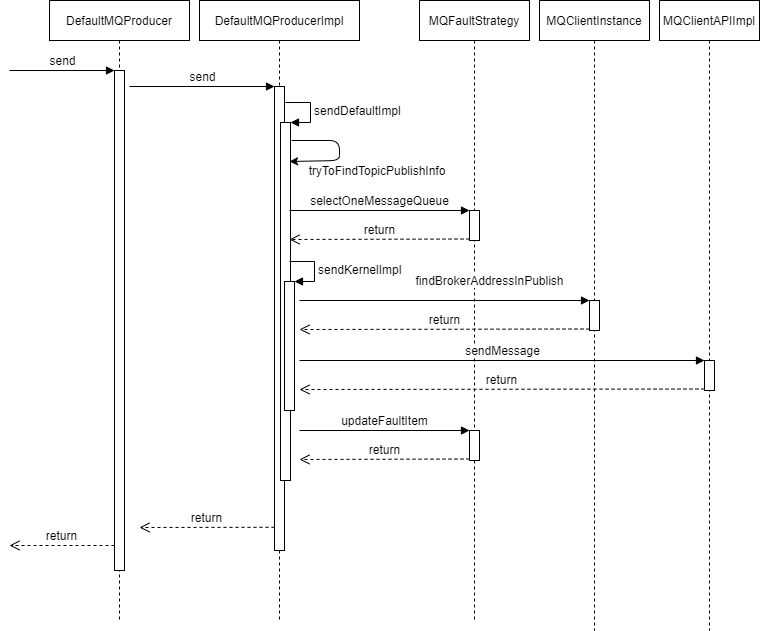这篇文章主要介绍了RocketMQ中如何实现producer消息发送,具有一定借鉴价值,感兴趣的朋友可以参考下,希望大家阅读完这篇文章之后大有收获,下面让小编带着大家一起了解一下。
RocketMQ中一个topic可以分布在多个broker上,每个broker上又可以包含多个message queue。每个message具体发送到哪个broker的哪个message queue中,这个决策过程是在client端完成的。client会从nameserver订阅topic的路由信息,按照一定的负载均衡算法为每个message选择出一个queue,并完成投递。producer的消息投递过程大体如下图:

producer的投递出错重试分为两种情况,同步出错重试(sync)以及异步出错重试(async)。同步发送出错重试是在DefaultMQProducerImpl.sendDefaultImpl 中完成:
// SYNC模式则开启重试,ASYNC模式重试在MQClientAPIImpl中实现
int timesTotal = communicationMode == CommunicationMode.SYNC ? 1 + this.defaultMQProducer.getRetryTimesWhenSendFailed() : 1;
int times = 0;
String[] brokersSent = new String[timesTotal];
for (; times < timesTotal; times++) { // 循环重试最多timesTotal次
String lastBrokerName = null == mq ? null : mq.getBrokerName();
MessageQueue mqSelected = this.selectOneMessageQueue(topicPublishInfo, lastBrokerName);
if (mqSelected != null) {
mq = mqSelected;
brokersSent[times] = mq.getBrokerName();
try {
// ....
sendResult = this.sendKernelImpl(msg, mq, communicationMode, sendCallback, topicPublishInfo, timeout - costTime);
endTimestamp = System.currentTimeMillis();
this.updateFaultItem(mq.getBrokerName(), endTimestamp - beginTimestampPrev, false);
// ...
} catch (RemotingException e) {
endTimestamp = System.currentTimeMillis();
this.updateFaultItem(mq.getBrokerName(), endTimestamp - beginTimestampPrev, true);
// ...
exception = e;
continue; // 出错,进入下一次重试
} catch (MQClientException e) {
endTimestamp = System.currentTimeMillis();
this.updateFaultItem(mq.getBrokerName(), endTimestamp - beginTimestampPrev, true);
// ...
exception = e;
continue; // 出错,进入下一次重试
} catch (MQBrokerException e) {
endTimestamp = System.currentTimeMillis();
this.updateFaultItem(mq.getBrokerName(), endTimestamp - beginTimestampPrev, true);
// ...
exception = e;
switch (e.getResponseCode()) {
case ResponseCode.TOPIC_NOT_EXIST:
case ResponseCode.SERVICE_NOT_AVAILABLE:
case ResponseCode.SYSTEM_ERROR:
case ResponseCode.NO_PERMISSION:
case ResponseCode.NO_BUYER_ID:
case ResponseCode.NOT_IN_CURRENT_UNIT:
continue; // 出错,进入下一次重试
default:
if (sendResult != null) { // 放弃重试
return sendResult;
}
throw e;
}
} catch (InterruptedException e) {
endTimestamp = System.currentTimeMillis();
this.updateFaultItem(mq.getBrokerName(), endTimestamp - beginTimestampPrev, false);
// ...
throw e; // 放弃重试
}
} else {
break;
}
}异步发送的出错重试则是在更底层的MQClientAPIImpl.sendMessageAsync里实现:
// 调用invokeAsync发送消息
this.remotingClient.invokeAsync(addr, request, timeoutMillis, new InvokeCallback() {
@Override
public void operationComplete(ResponseFuture responseFuture) {
long cost = System.currentTimeMillis() - beginStartTime;
RemotingCommand response = responseFuture.getResponseCommand();
// ...
if (response != null) {
try {
SendResult sendResult = MQClientAPIImpl.this.processSendResponse(brokerName, msg, response);
assert sendResult != null;
if (context != null) {
context.setSendResult(sendResult);
context.getProducer().executeSendMessageHookAfter(context);
}
try {
sendCallback.onSuccess(sendResult);
} catch (Throwable e) {
}
producer.updateFaultItem(brokerName, System.currentTimeMillis() - responseFuture.getBeginTimestamp(), false);
} catch (Exception e) {
producer.updateFaultItem(brokerName, System.currentTimeMillis() - responseFuture.getBeginTimestamp(), true);
// 发送成功,processSendReponse异常重试
onExceptionImpl(brokerName, msg, timeoutMillis - cost, request, sendCallback, topicPublishInfo, instance,
retryTimesWhenSendFailed, times, e, context, false, producer);
}
} else {
producer.updateFaultItem(brokerName, System.currentTimeMillis() - responseFuture.getBeginTimestamp(), true);
if (!responseFuture.isSendRequestOK()) {
MQClientException ex = new MQClientException("send request failed", responseFuture.getCause());
// 消息发送失败,重试
onExceptionImpl(brokerName, msg, timeoutMillis - cost, request, sendCallback, topicPublishInfo, instance,
retryTimesWhenSendFailed, times, ex, context, true, producer);
} else if (responseFuture.isTimeout()) {
MQClientException ex = new MQClientException("wait response timeout " + responseFuture.getTimeoutMillis() + "ms",
responseFuture.getCause());
// 发送超时,重试
onExceptionImpl(brokerName, msg, timeoutMillis - cost, request, sendCallback, topicPublishInfo, instance,
retryTimesWhenSendFailed, times, ex, context, true, producer);
} else {
MQClientException ex = new MQClientException("unknow reseaon", responseFuture.getCause());
// 其他错误,重试
onExceptionImpl(brokerName, msg, timeoutMillis - cost, request, sendCallback, topicPublishInfo, instance,
retryTimesWhenSendFailed, times, ex, context, true, producer);
}
}
}
});在异常处理的onExceptionImpl方法中会再次触发sendMessageAsync方法:
private void onExceptionImpl(final String brokerName,
final Message msg,
final long timeoutMillis,
final RemotingCommand request,
final SendCallback sendCallback,
final TopicPublishInfo topicPublishInfo,
final MQClientInstance instance,
final int timesTotal,
final AtomicInteger curTimes,
final Exception e,
final SendMessageContext context,
final boolean needRetry,
final DefaultMQProducerImpl producer
) {
int tmp = curTimes.incrementAndGet(); // 将已重试次数+1
if (needRetry && tmp <= timesTotal) { // 重试
String retryBrokerName = brokerName;//by default, it will send to the same broker
if (topicPublishInfo != null) { //select one message queue accordingly, in order to determine which broker to send
MessageQueue mqChosen = producer.selectOneMessageQueue(topicPublishInfo, brokerName);
retryBrokerName = mqChosen.getBrokerName();
}
String addr = instance.findBrokerAddressInPublish(retryBrokerName);
log.info("async send msg by retry {} times. topic={}, brokerAddr={}, brokerName={}", tmp, msg.getTopic(), addr,
retryBrokerName);
try {
request.setOpaque(RemotingCommand.createNewRequestId());
sendMessageAsync(addr, retryBrokerName, msg, timeoutMillis, request, sendCallback, topicPublishInfo, instance,
timesTotal, curTimes, context, producer);
} catch (InterruptedException e1) {
onExceptionImpl(retryBrokerName, msg, timeoutMillis, request, sendCallback, topicPublishInfo, instance, timesTotal, curTimes, e1,
context, false, producer);
} catch (RemotingConnectException e1) {
producer.updateFaultItem(brokerName, 3000, true);
onExceptionImpl(retryBrokerName, msg, timeoutMillis, request, sendCallback, topicPublishInfo, instance, timesTotal, curTimes, e1,
context, true, producer);
} catch (RemotingTooMuchRequestException e1) {
onExceptionImpl(retryBrokerName, msg, timeoutMillis, request, sendCallback, topicPublishInfo, instance, timesTotal, curTimes, e1,
context, false, producer);
} catch (RemotingException e1) {
producer.updateFaultItem(brokerName, 3000, true);
onExceptionImpl(retryBrokerName, msg, timeoutMillis, request, sendCallback, topicPublishInfo, instance, timesTotal, curTimes, e1,
context, true, producer);
}
} else {
// ...
}
}消息的负载均衡是通过MQFaultStrategy.selectOneMessageQueue方法来实现的:
public MessageQueue selectOneMessageQueue(final TopicPublishInfo tpInfo, final String lastBrokerName) {
if (this.sendLatencyFaultEnable) {
try {
int index = tpInfo.getSendWhichQueue().getAndIncrement();
for (int i = 0; i < tpInfo.getMessageQueueList().size(); i++) {
// 轮询的方式选择下一个queue
int pos = Math.abs(index++) % tpInfo.getMessageQueueList().size();
if (pos < 0)
pos = 0;
MessageQueue mq = tpInfo.getMessageQueueList().get(pos);
// 根据latency统计数据判断是否可用
if (latencyFaultTolerance.isAvailable(mq.getBrokerName())) {
// 优先选择同一个broker上的queue
if (null == lastBrokerName || mq.getBrokerName().equals(lastBrokerName))
return mq;
}
}
final String notBestBroker = latencyFaultTolerance.pickOneAtLeast();
int writeQueueNums = tpInfo.getQueueIdByBroker(notBestBroker);
if (writeQueueNums > 0) {
final MessageQueue mq = tpInfo.selectOneMessageQueue();
if (notBestBroker != null) {
mq.setBrokerName(notBestBroker);
mq.setQueueId(tpInfo.getSendWhichQueue().getAndIncrement() % writeQueueNums);
}
return mq;
} else {
latencyFaultTolerance.remove(notBestBroker);
}
} catch (Exception e) {
log.error("Error occurred when selecting message queue", e);
}
return tpInfo.selectOneMessageQueue();
}
return tpInfo.selectOneMessageQueue(lastBrokerName);
}感谢你能够认真阅读完这篇文章,希望小编分享的“RocketMQ中如何实现producer消息发送”这篇文章对大家有帮助,同时也希望大家多多支持亿速云,关注亿速云行业资讯频道,更多相关知识等着你来学习!
免责声明:本站发布的内容(图片、视频和文字)以原创、转载和分享为主,文章观点不代表本网站立场,如果涉及侵权请联系站长邮箱:is@yisu.com进行举报,并提供相关证据,一经查实,将立刻删除涉嫌侵权内容。